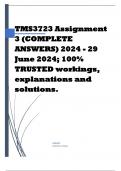TMS3723 Assignment
3 (COMPLETE
ANSWERS) 2024 - 29
June 2024; 100%
TRUSTED workings,
explanations and
solutions.
ADMIN
[COMPANY NAME]
,1. How does inquiry-based science education differ from traditional
science education? (20) 2. How can you effectively incorporate the
essential components of a science lesson plan such as learning
objectives, assessment strategies and instructional methods to ensure
the successful delivery of the lesson? (20)
1. Differences between Inquiry-Based Science Education and
Traditional Science Education
Inquiry-Based Science Education (IBSE)
1. Student-Centered Learning: IBSE places students at the
center of the learning process, encouraging them to ask
questions, conduct investigations, and draw conclusions based
on their findings.
2. Active Engagement: Students actively participate in
experiments, discussions, and problem-solving activities rather
than passively receiving information.
3. Constructivist Approach: This method is rooted in
constructivist theories, where learners build new knowledge
upon their existing understanding through exploration and
inquiry.
4. Emphasis on Process: The focus is on the scientific process,
including observing, hypothesizing, experimenting, and
analyzing data.
5. Critical Thinking and Problem Solving: Students develop
critical thinking skills as they evaluate evidence, draw
conclusions, and refine their understanding based on new data.
6. Collaborative Learning: Emphasis on group work and
collaboration, allowing students to learn from each other and
develop teamwork skills.
, 7. Real-World Relevance: Problems and questions posed in
IBSE often have real-world applications, making learning
more relevant and engaging for students.
8. Open-Ended Investigations: Students are often given open-
ended questions or problems that have multiple possible
solutions or approaches.
9. Teacher as Facilitator: Teachers act as facilitators or guides
rather than the primary source of knowledge, supporting
students in their investigative processes.
10. Flexible Curriculum: The curriculum can be more
flexible, allowing adjustments based on students' interests and
the direction of their inquiries.
Traditional Science Education
1. Teacher-Centered Learning: Traditional education is often
teacher-centered, with instructors delivering information and
students taking on a more passive role.
2. Lecture-Based Instruction: The primary mode of instruction
is through lectures, with a focus on delivering content and
factual knowledge.
3. Behaviorist Approach: Rooted in behaviorist theories,
emphasizing memorization, repetition, and reinforcement of
knowledge.
4. Emphasis on Content: Focus is on the acquisition of scientific
facts and concepts rather than the process of scientific inquiry.
5. Individual Learning: Students typically work individually,
with less emphasis on collaborative learning and teamwork.
6. Assessment of Knowledge: Assessments are often based on
the recall of information and standardized testing rather than
the application and synthesis of knowledge.
7. Structured Curriculum: The curriculum is more rigid, with a
predefined sequence of topics and lessons.




